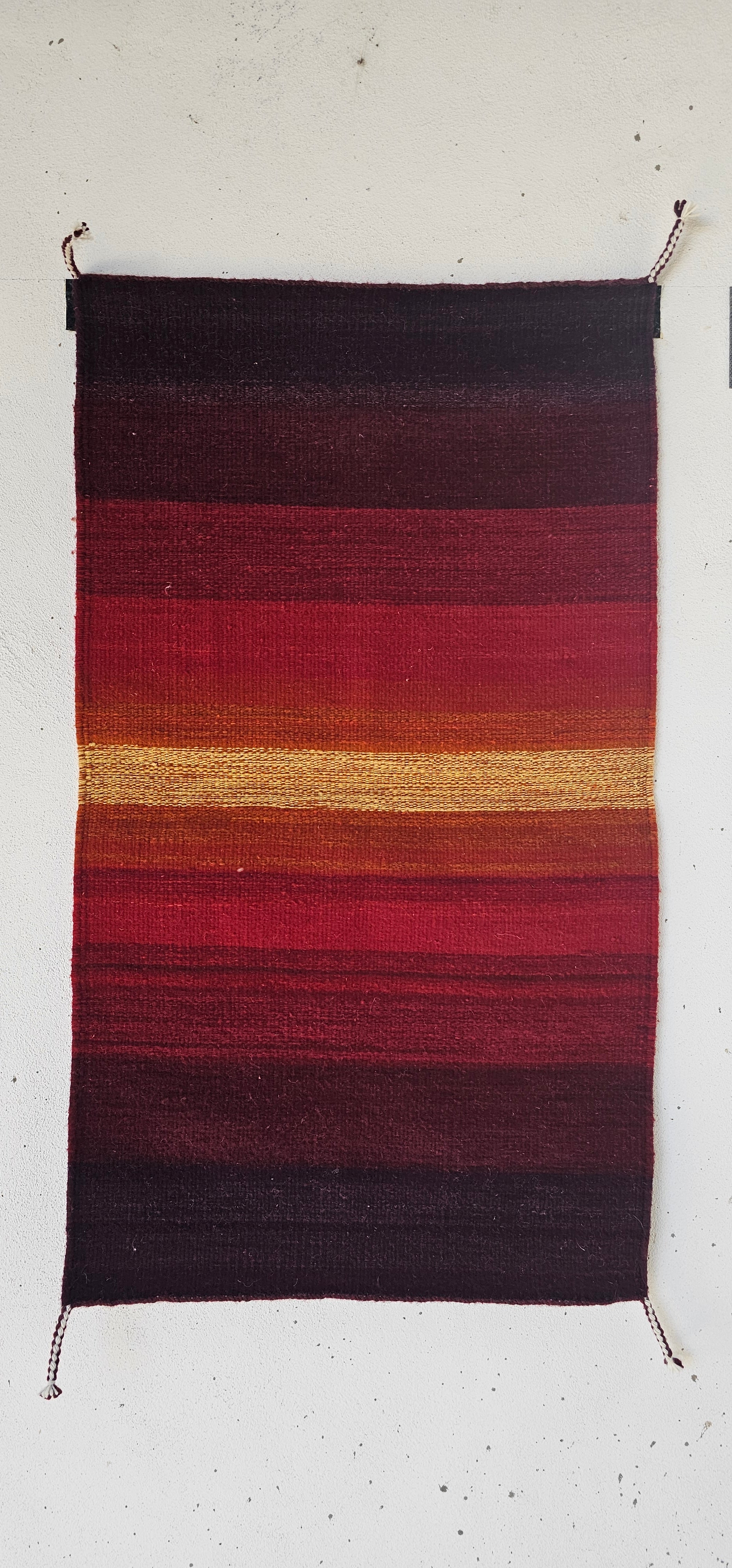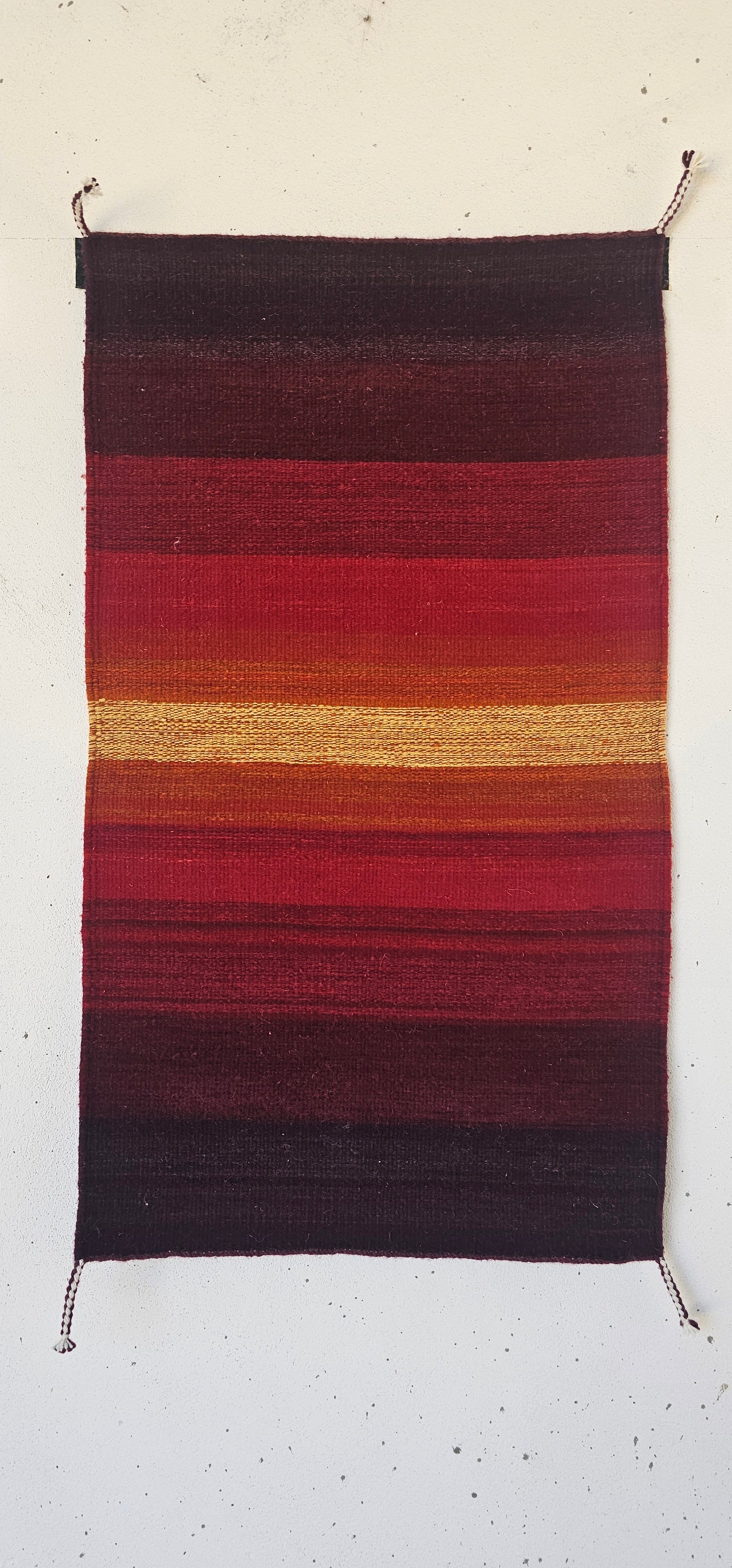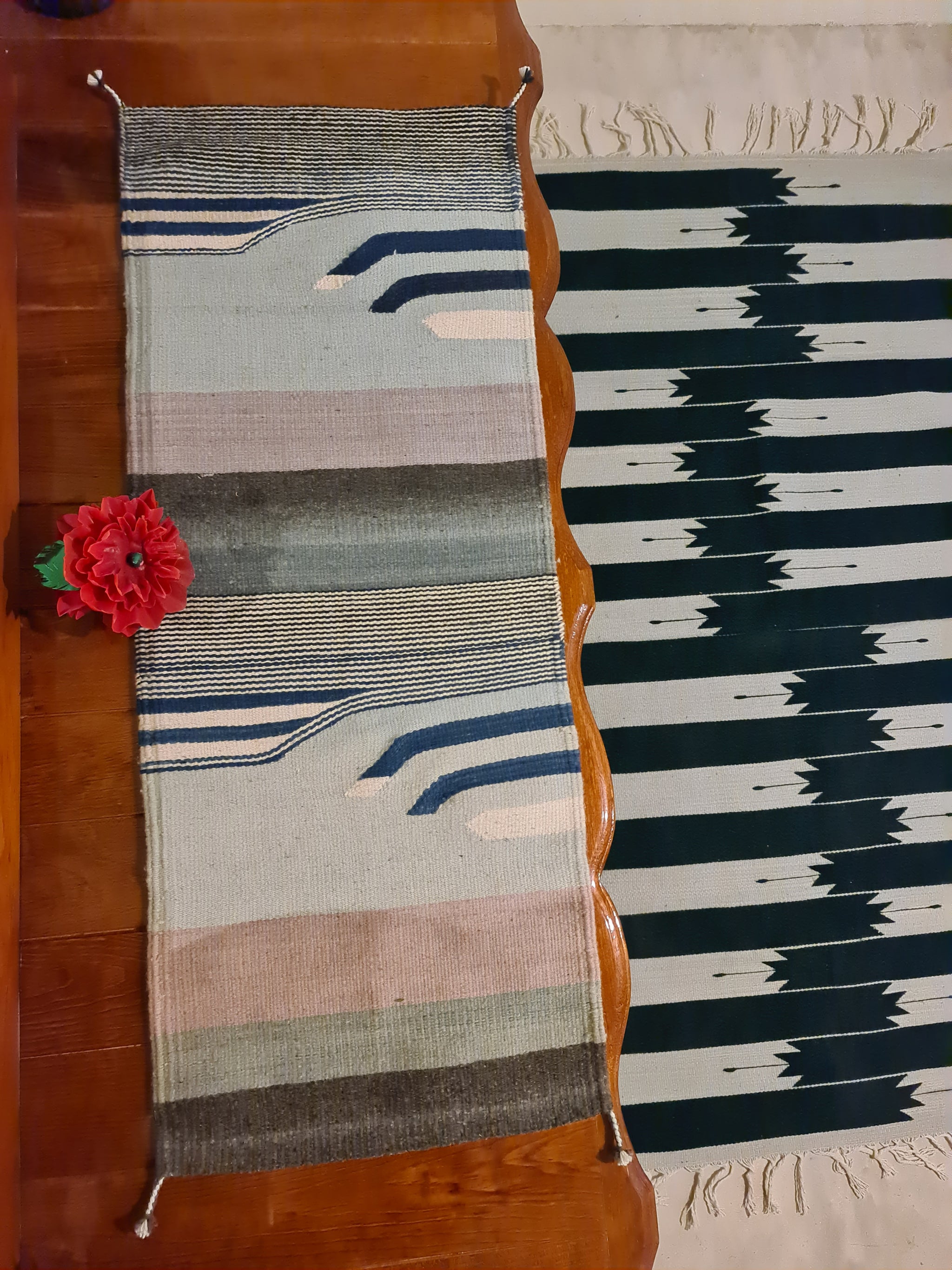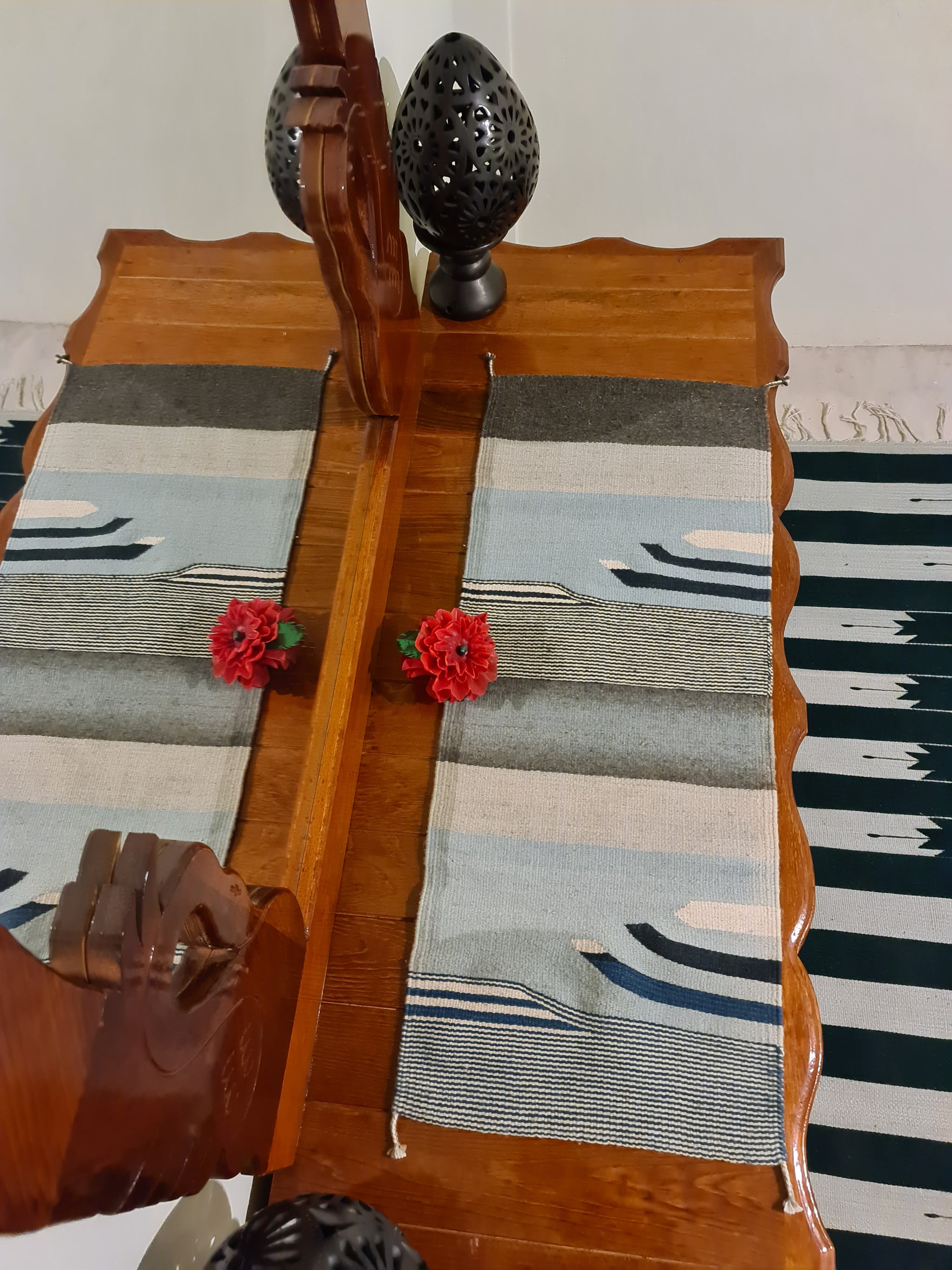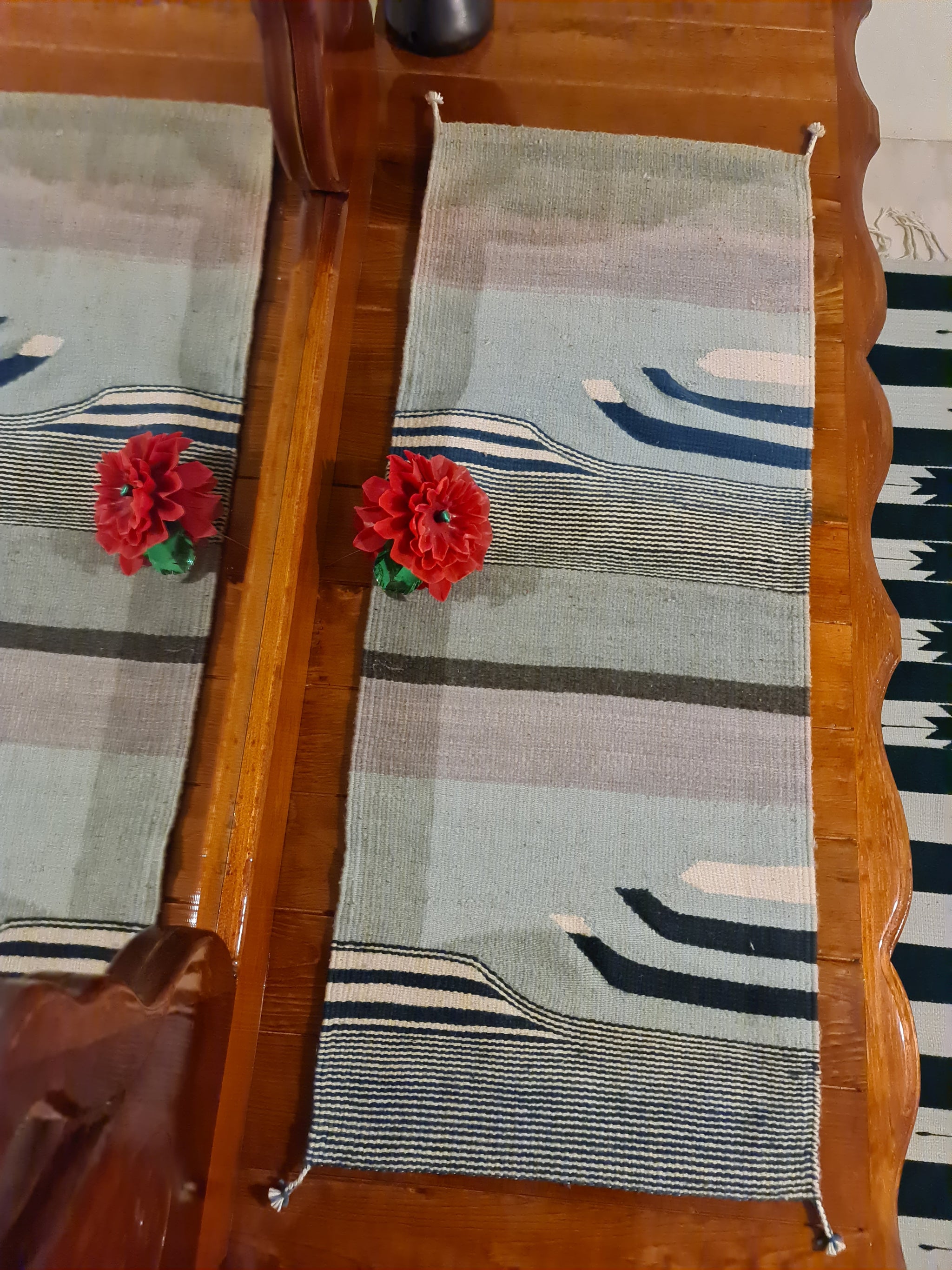Shi seedigaak lougueshliuú: vissions for the earth
$ 8,300.00
Size: 60x96cm; 2x3ft
Weaver: Samuel Bautista Lazo
Materials and methods: woven using natural and aniline dyed wool left over from student classes and other projects. Hand woven on a Zapotec walking loom of the XVI century style using a 7 threads per inch reed and wool/rayon blend for warp.
Design, patterns and symbols.
This rug starts with traditional patterns such the smile pattern that reminds us that laughing and smiling is the source of true healing, meaning that a change in our attitude and a desire to heal is a prerequisite of the healing process.
I wove a river and rain pattern to illustrate the imporantance of water in our relationship with the earth. Our ancestors have been tracking climate change since 10,000 years ago because we have been paying close atention to the rain patterns as it is crucial for our milpa food system.
Next I have a pattern that represents mountains but I have woven these made of smile, river and rain patterns to overlap those symbols into the mountains. You could think of a mountain of smiles, rivers and rain, does that make literal sense? Here I choose the color yellow because at the time there are many fires going on around Oaxaca, this year has been particularly strong with the fire element on the planet. Developed countries have forgoten to feed their relationship with fire and the land. Indigenous people in this continent have maintained traditional fire burns to tend the land and prevent the overacumulation of organic matter that fuels wild fires. In our village, I noticed that we don't a fire fighting department but we do tend the fire communally. There is a comittee that is elected every two years to keep an eye on fires in the mountains, they carry out rounds of inspection and tend the small fires that arise during the dry spell, if a fire grows too big they ring the bell and call the community in for help. Many volunteers hike up to the mountains and help tend and steer the fire towards safe zones. Using low tech and high community involvement we are able to manage the fires and tend the land. Mountains are sacred altars that elevate our spirits towards the sky and let our eyes contemplate the landscape from big picture perspective. Our ancestors have migrated and followed mountain ranges for thousands of years in their pilgrimage around the world, they provide food, water and vission; maybe that is we call them sacred elders in our language, Daiín.
The next chunk is an earthy tone that represents a flat valley. In a fertile flat valley like this, our ancestors developed and refined agriculture. The Central Valley of Oaxaca creates a predictable microclimate that allowed the cloud people tuned into the rain patterns and cultivate corn twice a year. The cloud people layed the foundations of a very precise calendar system based on the moon, the earth's cycle around the sun and even took into account the cycles of Venus. After a golden era that lasted roughly 1000 years, our ancestors decided to abandon their cities and bury them letting nature claim the sites. These days Silicon Valley is a place on earht that is shaping the world with is economic and technological precense, that is why I planted a microchip in this part of my weaving. I have been playing with this idea since 2007 before I left to study for my PhD in Sustainable Manufacturing. It seems like we are digging precious materials from the earth's crust to store our stories, memories and feelings into them. Could this be a way in which life is transfering consciousness from the organic bodies into the inorgainc elements? Could it be a way in which our ancestors related to minerals and cristals? Some say that our technology as it advances it would look more like magic, I just hope that it ends up looking like an avatar (film) type of technology that is rooted into ancestral wisdom and respect for life.
The next chunk of earth toned weaving represents the bleeding of the earth due to the unceeding growth of our modern production and consumption system. Some native people have noted how the western world advances destroying nature's life support systems while writing their history on the skin of trees with the boold of many animal and human beings. Already many indigenous tribes are putting their lives at risk and their entire communities in the front lines to stop mega projects (urban development, mining, dams, and cattle ranching operations to name a few examples). It will take a wave of blood to stop this unceeding ecnomic growth paradigm as represented by a red stripe that will run across the earth with the blood of native people and animals to protect the earth.
The remaining of this rug represents the oceans of the world, Niis Douu, as we call it, the inmense calmed waters. Given the predictions of climate change, if we don't stop emiting carbon into the atmoaphere and the warming continues, we will see a huge sea level rise that will affect a significant part of the world that lives in and around the oceans. Most of the world's most important cities are located near the coasts, scholars say that it might be due to the fact that we populated the world following coastlines. We probably also evolved our very complex brains thanks to the nutrient rich seafood that we gathered around coastal lines. In this future case scenario, it is inevitable that oceans will play a significant role in shaping humanitie's future. Life started in the oceans after all. Scientists estimate that 50-80% of the earth's oxygen comes from the ocean and yet we are threatening the very basic food chain of the oceans with our activity leading to ocean acidification. The world fishing is depleting life in the oceans and deep sea mining projects are becomeing technologically possible and economically feasible. Are we going to do the same we are doing to the Amazon to the oceans? We need to listen to the whales, the time kepers and story tellers of the planet, many native people have established a relationship with this ancient mamal relative of us, listen to the whale and what it has to say about the oceans. If we do not listen and change, life will continue but probably we won't be part of the delicate tapestry of life anymore. The escence of life will remain dormant and protected in the oceans of the world.
Share:
Related Items
Punta Cometa: fire tending
$ 4,600.00
60x100cm; 2x3ft Materials ans methods: criollo sheep wool hand dyed with colorfast aniline dyes using an exhaustive method. Handwoven on a Zapotec style loom of the 16th century adapted from European...
River Spirit
$ 3,110.00
Size: 40x100cm; 16in x 3.2ft Weaver: Zenaida Lopez from San Miguel del Valle Materials and Methods: Criollo sheep wool hand dyed by Leonor Lazo and Samuel Bautista using xiuhquilitl (indigo)...
Yaag Chei: tree of life
$ 5,500.00
Size: 60x100cm; 2x3ft Master Weaver: Samuel Bautista Lazo Materials and methods: criollo sheep wool spun in the mills of the Batalla family in Tianguistengo. Hand dyed yarns by Leonor Lazo using...










